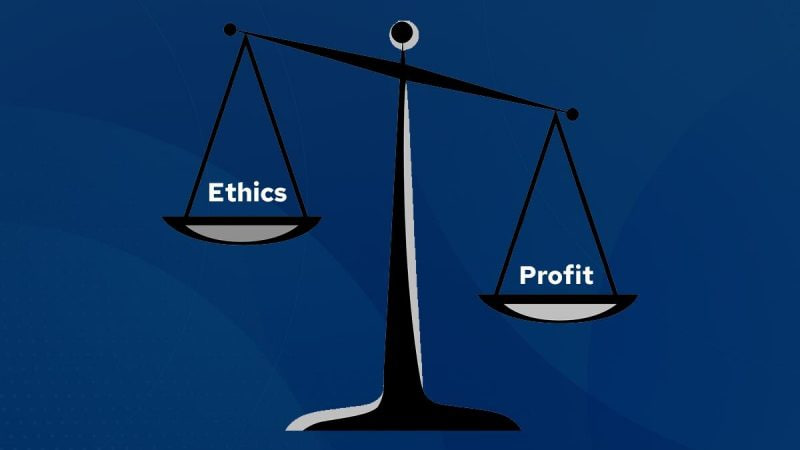Profit and Integrity: Consultants’ Ethical Standards: Balancing -Part I
Introduction to Ethical Standards in Consulting
Ethical considerations are crucial for establishing the profession's credibility, reliability, and long-term viability in the intricate and ever-evolving consulting realm.
Consultants face a variety of ethical dilemmas while dealing with complex organizational challenges, necessitating deep reflection and moral decision-making. This article addresses the diverse aspects of ethical standards in consulting, highlighting the delicate balance between profit and integrity.
The Dual Imperative: Profit and Integrity
Profit’s Necessity
Consultants work in a competitive environment where financial success is a primary goal. Profits are essential for firms' sustainability, enabling growth and rewarding stakeholders. However, profits can sometimes conflict with ethical considerations. For example, maximizing billable hours or securing lucrative contracts may tempt consultants to compromise their ethical standards.
Integrity’s Necessity
Concurrently, consultants are entrusted with confidential information, strategic insights, and organizational well-being. Maintaining integrity involves adhering to ethical principles, ensuring transparency, and protecting client interests. Ethical breaches can erode trust, damage reputations, and threaten long-term relationships.
Ethical Suspicions
Conflict of Interest
Consultants face the challenge of balancing multiple interests, such as those of clients, shareholders, and colleagues.
This requires sound judgment. For example, when a consultant recommends cost-cutting measures that could result in employee layoffs, the tension between professional responsibility and compassion underscores the need for careful ethical decision-making.
Transparency
Transparency is foundational. Consultants must ensure that clients fully understand recommendations, risks, and potential consequences.
Failing to disclose relevant information constitutes a violation of established ethical standards. For example, if a consultant recommends a high-risk investment without adequately outlining the downsides, it may undermine client trust.
Ethical Frameworks and Decision-Making Models
Utilitarianism: Some consultants adopt a utilitarian perspective focused on maximizing overall benefit. They evaluate the positive and negative consequences of their actions in pursuit of the greater good. However, this approach may overlook individual rights or minority interests.
Deontology
Others adhere to strict ethical principles, emphasizing duty and moral rules. They prioritize honesty, confidentiality, and fairness. However, rigid adherence to these principles may limit flexibility and adaptability in complex situations.
Virtue Ethics
Consultants who embrace virtue ethics focus on cultivating personal qualities such as honesty, courage, and empathy. They believe these virtues guide ethical behavior. However, virtues may be context-dependent, leading to subjective interpretations and variations in application.
Case Studies: Ethical Dilemmas in Consulting
Example 1: Client Conflicts of Interest
A consultant may work with two competing companies in the same industry. When confidential information leaks from one client to another, the ethical lines become blurred. Should the consultant reveal this breach? Which client's interests should be prioritized?
Example 2: Data Manipulation
A data analyst consultant faces pressure to skew data to align with the client's preferred outcome. Balancing honesty with client satisfaction becomes a challenging ethical dilemma.
Example 3: Whistleblowing
A consultant may uncover fraudulent activities within a client's organization. Reporting them poses risks to their relationship with the client, yet they are committed to integrity. How should the consultant navigate this situation?
The Bottom Line
Consulting ethical standards are dynamic; they evolve with societal norms, technological progress, and industry dynamics.
Balancing profit and integrity requires continuous dialogue, self-reflection, and a commitment to ethical growth. Consultants must recognize that their decisions impact organizations, communities, and the trust placed in the consulting profession beyond boardrooms.

Examining What Defines an Ethical Dilemma for Consultants
Understanding Ethical Dilemmas
Ethical dilemmas are not merely theoretical constructs but real challenges that consultants face daily. These situations arise when values, interests, or obligations conflict, leaving the consultant in a quandary between opposing choices. The core issue is balancing what is morally right and what is practically required. Consider these scenarios:
1. Client Confidentiality vs. Public Interest
Envision a consultant collaborating with a high-profile client who requests that they conceal critical information from the public. Preserving client confidentiality is vital for fostering trust and maintaining long-term relationships.
Conversely, revealing this information might avert potential harm to society. The consultant faces an ethical dilemma: loyalty to the client versus accountability to the community.
2. Profit Maximization vs. Stakeholder Care
Consultants often face pressure to increase their clients' or organizations' profits. However, this pursuit may conflict with caring for other stakeholders: employees, customers, or the environment. For example, recommending cost-cutting strategies that could compromise employee safety raises ethical concerns. So, balancing financial gains with social responsibility becomes a challenging ethical task.
Ethical Frameworks and Decision-Making Models
To navigate these dilemmas, consultants rely on ethical frameworks and decision-making models. Here are some commonly used approaches:
1. Utilitarianism
This framework assesses actions based on their overall consequences. Consultants weigh the benefits and drawbacks for all affected parties. In our confidentiality example, the consultant assesses whether disclosing the information serves the public good.
2. Deontology
Deontological ethics focus on duty and moral principles. Consultants adhere to rules and obligations regardless of the outcomes. When facing conflicting loyalties, they consider their duty to both the client and society.
3. Virtue Ethics
This approach focuses on personal qualities. Consultants cultivate virtues such as honesty, integrity, and empathy. They ask themselves: What would an ethical consultant do in this situation? Then, they take action based on their answer.
External Pressures and Organizational Culture
Ethical dilemmas are not isolated incidents; they occur within a broader context. External pressures, such as tight deadlines, financial constraints, or organizational politics, can exacerbate dilemmas.
Furthermore, organizational culture shapes consultants' ethical perspectives. A culture that prioritizes profit above all else may lead to unethical choices.
Example: A consultant working in a profit-focused firm faces pressure to overlook the client’s environmental violations. The firm's culture implicitly condones such behavior, forcing the consultant to decide whether to accept or reject this practice.
Navigating Uncertainties and Seeking Guidance
Not all dilemmas have clear solutions. Consultants encounter uncertainties that cannot be definitively categorized as right or wrong. In such cases, seeking guidance becomes essential. They may consult colleagues, mentors, or professional associations.
Example: A consultant may suspect financial fraud within a client's organization but lacks conclusive evidence. In this scenario, they should seek advice from an ethics committee or legal counsel to make an informed decision.
In summary, the ethical dilemmas consultants face are complex and range from conflicting values, organizational pressures, and individual integrity.
Consultants must carefully consider their options and proceed cautiously as they negotiate these complexities, as their decisions extend beyond the boardroom.
Examining the Balance Between Profitability and Integrity
Profit Maximization vs. Ethical Behavior: Exploring the Balance
In the complex landscape of business consulting, the intersection between profit maximization and ethical behavior represents a fundamental dilemma.
As trusted advisors to organizations, consultants face the challenge of balancing financial gains and maintaining integrity. Here, we delve into the nuances of this balance, exploring different dimensions and perspectives:
1. The Profit’s Necessity
Perspective
Maximizing profit is essential from a shareholder-centric viewpoint. Organizations are expected to deliver returns to their investors; consultants are pivotal in achieving this goal.
Dilemma
However, pursuing profit can sometimes lead to ethically questionable decisions. Consultants may face pressure to circumvent rules, exaggerate outcomes, or compromise principles to secure lucrative contracts.
Example
A management consultant advising a pharmaceutical company is facing a crucial decision: Should it withdraw a defective drug that poses risks to patients? The consultant's recommendation directly impacts profits, but ethical considerations demand prioritizing patient safety.
2. Ethical Boundaries
Perspectiv
Ethical behavior involves honesty, transparency, and adherence to moral principles. Consultants are expected to maintain these standards while navigating complex relationships with clients.
Dilemma
Balancing client demands with ethical boundaries can be challenging. Consultants may encounter situations where clients request actions that conflict with their personal values or professional ethics.
Example
A cybersecurity consultant discovers a vulnerability in a client's system that could lead to a massive data breach. The client insists on concealing it to avoid damage to their reputation. The consultant faces a dilemma: comply with the client's request or disclose the risks to protect stakeholders.
3. Long-Term Reputation vs. Short-Term Gains
Perspective
A consultant's reputation is invaluable. Ethical behavior contributes to long-term success, earning client trust and fostering referrals.
Dilemma
Short-term financial gains may tempt consultants to compromise their reputations. Succumbing to such pressures can damage their standing in their field.
Example
A construction company hires an environmental consultant to assess the impact of a proposed project on local ecosystems. The company wants a favorable report to expedite approvals. The consultant has a choice: provide an accurate assessment (which may delay the project) or prepare a biased report for immediate financial gains.

4. Stakeholder Considerations
Perspective
Consultants serve multiple stakeholders: clients, employees, communities, and society as a whole. Their ethical decisions impact these interconnected networks.
Dilemma
Increasing profits may benefit one group of stakeholders while harming others. Consultants must strike a balance among all parties involved.
Example
A strategic consultant advises a manufacturing company on cost-cutting measures. The proposed layoffs would boost profits but devastate local communities. The consultant bears the responsibility for the impact on both shareholders and employees.
5. Navigating Ambiguities
Perspective
Ethical dilemmas often lack clear-cut solutions. Consultants frequently find themselves in ambiguous situations.
Dilemma
How can principled choices be made when interests conflict? The absence of clear and decisive answers requires careful judgment.
Example
A financial consultant discovers discrepancies in a client's financial statements. Reporting them may harm the client's stock price and invite legal consequences. The consultant must balance legal obligations, professional duty, and ethical responsibility.
Balancing profit maximization and ethical behavior is a fundamental challenge for consultants. As the business environment evolves, professionals must adeptly navigate this complex landscape, drawing insights from various perspectives while remaining committed to integrity.
In Conclusion
This part of the article discusses three ethical criteria for consultants, and Part II addresses three additional ones.
Ads space
Latest Articles
Stay up-to-date with the latest
Be aware of the latest articles, resources and upcoming courses









